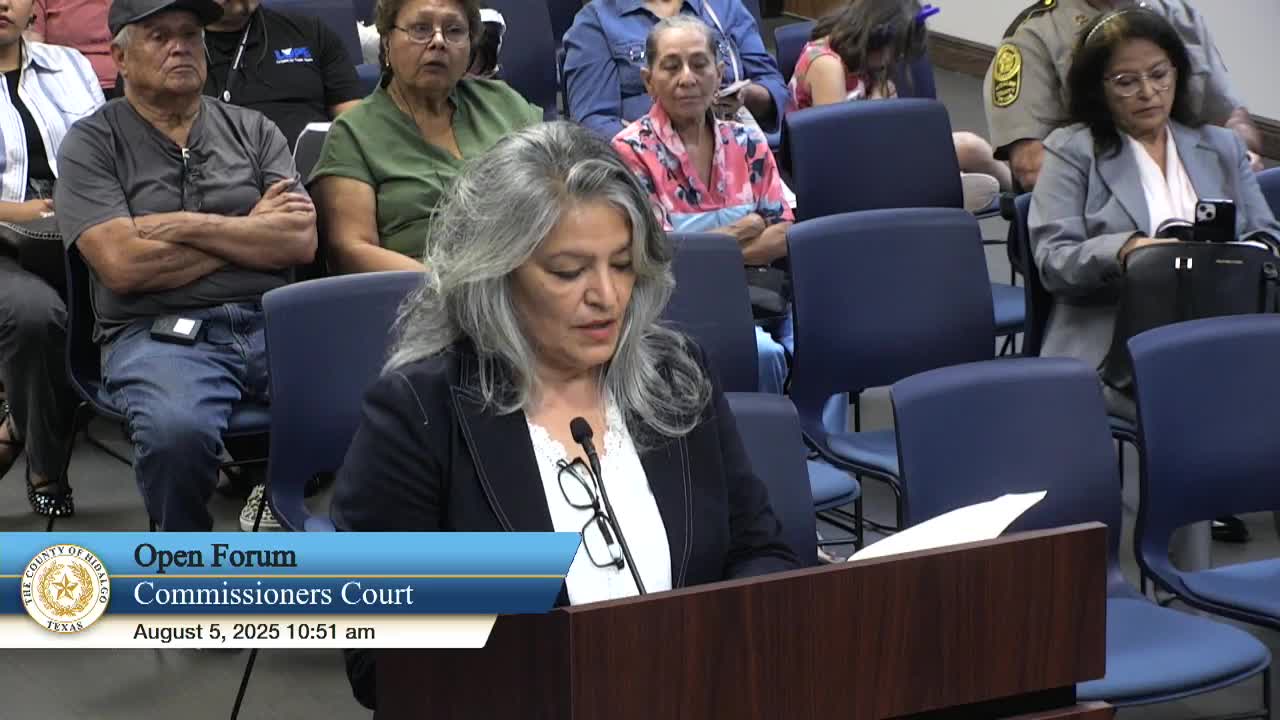Paciano Waddoning challenges Texas laws in United States Supreme Court litigation
August 05, 2025 | Hidalgo County, Texas
This article was created by AI summarizing key points discussed. AI makes mistakes, so for full details and context, please refer to the video of the full meeting. Please report any errors so we can fix them. Report an error »

The Hidalgo County Commissioner’s Court meeting on August 5, 2025, featured a significant discussion regarding the constitutionality of state laws in Texas. The meeting began with a focus on the implications of state legislation that may conflict with the United States Constitution.
A key speaker addressed the court, emphasizing that state laws cannot supersede federal constitutional requirements. They referenced specific provisions, including the Fifth Amendment, which mandates that no individual should face serious charges without a grand jury indictment. The speaker argued that Texas has enacted laws allowing prosecutors to charge individuals without this requirement, which they deemed unconstitutional.
The discussion also highlighted Article 1, Section 10 of the Constitution, which prohibits states from enacting laws that impair contractual obligations. The speaker asserted that public officials, including police and prosecutors, are bound by their oaths to uphold the Constitution, and any state law directing them to act otherwise constitutes a violation of this obligation.
Furthermore, the speaker invoked the Fourteenth Amendment, stating that no state should create laws that infringe upon the privileges and immunities of U.S. citizens, particularly those outlined in the Bill of Rights. They claimed that current Texas laws are inferior to the Constitution and have led to the unlawful imprisonment of individuals.
The speaker concluded by warning the court that continued support for laws that violate constitutional rights could result in criminal sanctions against public officials. This statement underscored the ongoing legal challenges, including a case being litigated in the U.S. Supreme Court by Paciano Waddoning, aimed at addressing these constitutional concerns.
Overall, the meeting underscored the tension between state legislation and constitutional mandates, raising critical questions about the enforcement of laws in Texas and their alignment with federal standards. The court's response to these assertions and any subsequent actions remain to be seen.
A key speaker addressed the court, emphasizing that state laws cannot supersede federal constitutional requirements. They referenced specific provisions, including the Fifth Amendment, which mandates that no individual should face serious charges without a grand jury indictment. The speaker argued that Texas has enacted laws allowing prosecutors to charge individuals without this requirement, which they deemed unconstitutional.
The discussion also highlighted Article 1, Section 10 of the Constitution, which prohibits states from enacting laws that impair contractual obligations. The speaker asserted that public officials, including police and prosecutors, are bound by their oaths to uphold the Constitution, and any state law directing them to act otherwise constitutes a violation of this obligation.
Furthermore, the speaker invoked the Fourteenth Amendment, stating that no state should create laws that infringe upon the privileges and immunities of U.S. citizens, particularly those outlined in the Bill of Rights. They claimed that current Texas laws are inferior to the Constitution and have led to the unlawful imprisonment of individuals.
The speaker concluded by warning the court that continued support for laws that violate constitutional rights could result in criminal sanctions against public officials. This statement underscored the ongoing legal challenges, including a case being litigated in the U.S. Supreme Court by Paciano Waddoning, aimed at addressing these constitutional concerns.
Overall, the meeting underscored the tension between state legislation and constitutional mandates, raising critical questions about the enforcement of laws in Texas and their alignment with federal standards. The court's response to these assertions and any subsequent actions remain to be seen.
View full meeting
This article is based on a recent meeting—watch the full video and explore the complete transcript for deeper insights into the discussion.
View full meeting
